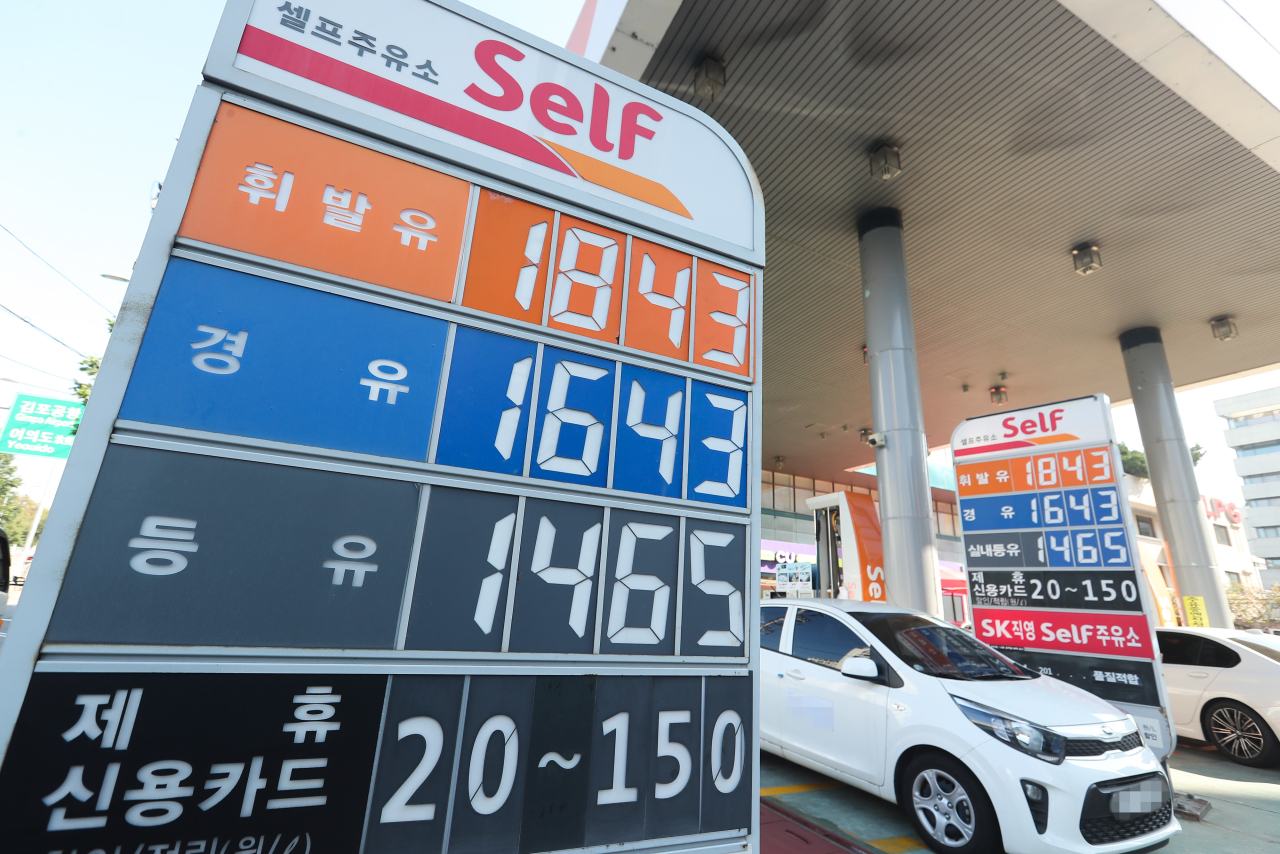S. Korea alarmed by surging fuel prices, inflationary pressure
Government likely to temporarily cut fuel tax by 15% to ease inflationary pressure
By Jung Min-kyungPublished : Oct. 24, 2021 - 15:24

South Korea has been alarmed by rising inflation due to surging fuel prices and is likely to cut taxes on oil and liquefied natural gas by 15 percent and 2 percent, respectively, to ease some upward pressure, sources said Sunday.
The government has been reviewing various measures to alleviate inflationary pressure after the nation’s central bank said that producer prices in September saw the largest on-year gain in a decade. The producer price index, a barometer of future consumer inflation, increased 7.5 percent on-year to 111.13 last month, marking the sharpest on-year gain since April 2011, when the reading grew 8.1 percent.
The BOK cited a surge in coal and oil prices as a key catalyst, which gained 2.1 percent on-month. A price surge in raw materials was also a key factor. Meanwhile, prices of fishery, forest and farming products fell 0.8 percent over the cited period, the data showed.
To ease burdens from consumers here, government officials said they are reviewing temporarily slashing oil taxes by 15 percent and lowering the tax on LNG to zero from the current 2 percent. The tax cut could be adopted as early as next month, sources said.
A government official said that the relevant ministries have considered precedents of 7 to 15 percent oil tax cuts, under the current legal cap of a 30 percent cut. They are highly likely to decide on 15 percent, the official added.
If the 15 percent tax cut is fully adopted, the average nationwide gasoline price would decline by 123 won ($0.10) per liter under the current price range. The average nationwide gasoline price stood at 1,732 won in the third week of October, according to data service provided by the Korea National Oil Corp.
But skeptics say the effect of the tax cut will depend on how many gas stations actually uphold the measure. A civic group claimed that only 47 percent of gas stations nationwide adopted the oil tax cut back in 2018.
“The tax cut could alleviate some burden off corporate shoulders, but it is unknown whether it will bring about the intended effect on inflation,” said Kim So-young, an economics professor at Seoul National University.
Overall, surging energy bills have grown as a main concern behind the nation’s growing inflationary pressure in recent months. The state-run Korea Electric Power Corp. raised the electricity bill by 3 won per kilowatt-hour last month, citing the surging price of LNG. It marks the first increase since November 2013.
First Vice Finance Minister Lee Eog-weon recently said consumer prices are forecast to grow beyond 2.5 percent in October due largely to last year’s low base effect.
The government has been reviewing various measures to alleviate inflationary pressure after the nation’s central bank said that producer prices in September saw the largest on-year gain in a decade. The producer price index, a barometer of future consumer inflation, increased 7.5 percent on-year to 111.13 last month, marking the sharpest on-year gain since April 2011, when the reading grew 8.1 percent.
The BOK cited a surge in coal and oil prices as a key catalyst, which gained 2.1 percent on-month. A price surge in raw materials was also a key factor. Meanwhile, prices of fishery, forest and farming products fell 0.8 percent over the cited period, the data showed.
To ease burdens from consumers here, government officials said they are reviewing temporarily slashing oil taxes by 15 percent and lowering the tax on LNG to zero from the current 2 percent. The tax cut could be adopted as early as next month, sources said.
A government official said that the relevant ministries have considered precedents of 7 to 15 percent oil tax cuts, under the current legal cap of a 30 percent cut. They are highly likely to decide on 15 percent, the official added.
If the 15 percent tax cut is fully adopted, the average nationwide gasoline price would decline by 123 won ($0.10) per liter under the current price range. The average nationwide gasoline price stood at 1,732 won in the third week of October, according to data service provided by the Korea National Oil Corp.
But skeptics say the effect of the tax cut will depend on how many gas stations actually uphold the measure. A civic group claimed that only 47 percent of gas stations nationwide adopted the oil tax cut back in 2018.
“The tax cut could alleviate some burden off corporate shoulders, but it is unknown whether it will bring about the intended effect on inflation,” said Kim So-young, an economics professor at Seoul National University.
Overall, surging energy bills have grown as a main concern behind the nation’s growing inflationary pressure in recent months. The state-run Korea Electric Power Corp. raised the electricity bill by 3 won per kilowatt-hour last month, citing the surging price of LNG. It marks the first increase since November 2013.
First Vice Finance Minister Lee Eog-weon recently said consumer prices are forecast to grow beyond 2.5 percent in October due largely to last year’s low base effect.









![[Kim Seong-kon] Democracy and the future of South Korea](http://res.heraldm.com/phpwas/restmb_idxmake.php?idx=644&simg=/content/image/2024/04/16/20240416050802_0.jpg&u=)








![[KH Explains] Hyundai's full hybrid edge to pay off amid slow transition to pure EVs](http://res.heraldm.com/phpwas/restmb_idxmake.php?idx=652&simg=/content/image/2024/04/18/20240418050645_0.jpg&u=20240418181020)

![[Today’s K-pop] Zico drops snippet of collaboration with Jennie](http://res.heraldm.com/phpwas/restmb_idxmake.php?idx=642&simg=/content/image/2024/04/18/20240418050702_0.jpg&u=)